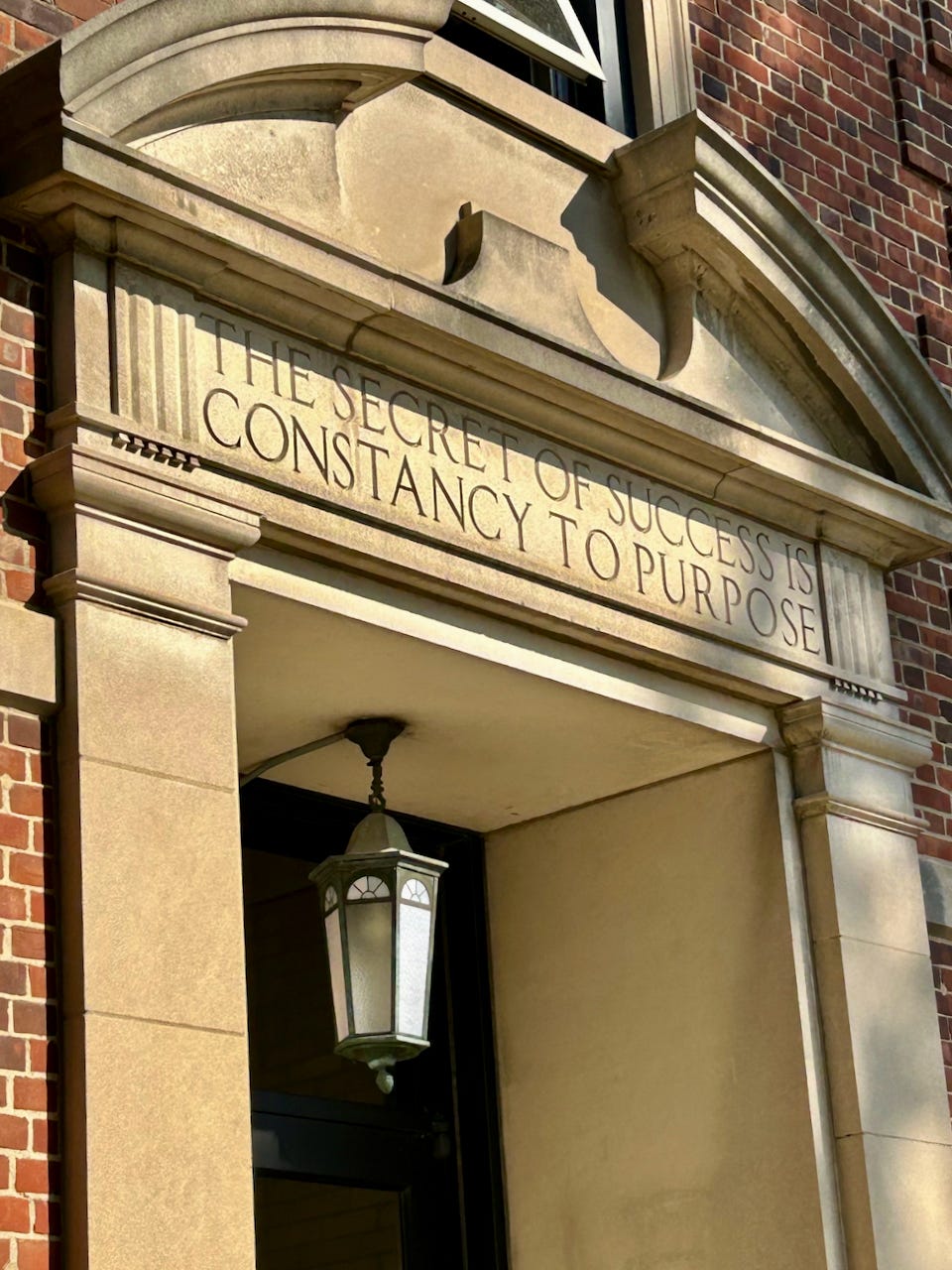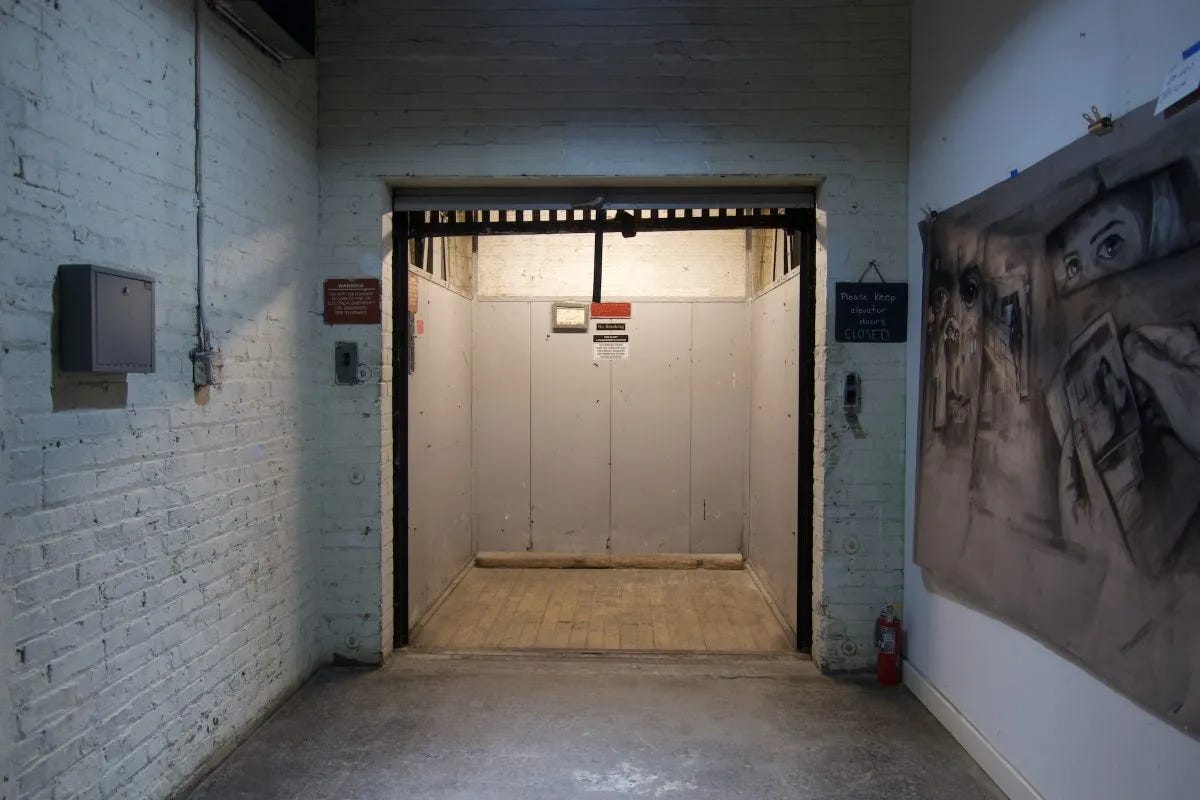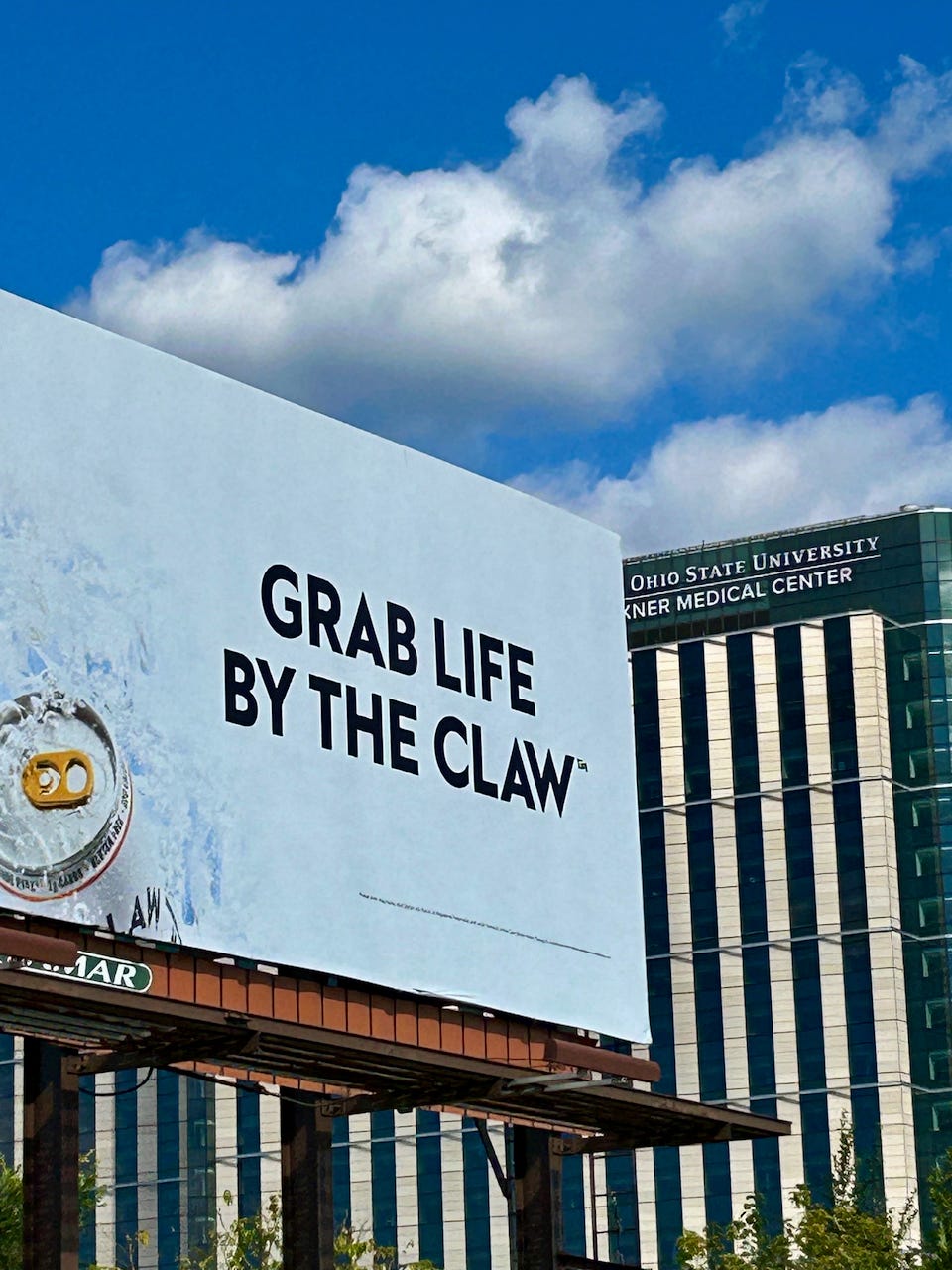Trigger Happy: Does Life Need A Warning Label?
Noticing Generational Differences
Quote in 1872 by Benjamin Disraeli, Prime Minister of the United Kingdom, over the doorway of the Union Middle School in Upper Sandusky, built in 1897 — beginning the trend of consolidating one-room school houses.
~~~
Ok, they’ve got me wondering again…
How and Why do I think differently than the younger crowd? How big is the gap between us? Why did my Teacher of the Year daughter say I’d probably be fired if I were still teaching today? Ha! Is it because I’m old and crusty?
After talking to a lot of voters recently, I found out most of the younger ones in our community wanted a new school. I could get really excited about that myself — how much more students could have produced in a state-of-the-art high school TV studio instead of the makeshift corner in my room (with equipment I had to piece together.) But what I really wanted to know was why the young folks, themselves, wanted a new building. I have to admit I was kinda surprised by some of their reasons.
“It’s a pride thing.”
“Everyone else around us has a new building.”
“Our kids deserve better.”
“It’s embarrassing.”
Interesting.
I guess we think differently on that. I’m not embarrassed by old. I kinda respect it. Thank heavens, since I’m teetering on 80. Ha!
To be honest, I’m the kind of person who was awestruck when I climbed the steps to the iconic Colosseum in Rome, the ancient Acropolis in Athens — a person whose heart sang the theme song from FAME when I rode the rickety freight elevator up to the School of Arts in Toledo, Ohio.
I’ve never been ashamed of our older school buildings here in Upper Sandusky — maybe embarrassed by some of the people and things going on inside of them, but that’s for another article another day. Ha!
Well, one of my former students suggested I read Generations by Dr. Jean M. Twenge to find the answers to my questions about how and why we are different? I’m so grateful for the recommendation because I’ve loved the 515-page book based on Twenge’s thesis: technology has influenced the way we live and how we view things more than any major historical event. With six (6) generations in the United States and the enormous technological changes over the last 100 years, no wonder there’s a lot of division among us.
As a retired communications teacher born in 1946, I was most fascinated with her pages concerning young people’s views on limiting free speech and demanding trigger warnings in order to feel comfortable.*
Ah, ha I finally got it — why my daughter thinks I’d get the ax as a teacher today. You see, I actually TRIED TO TRIGGER my students from 1970’s to early 2000’s. I used emotional appeal almost daily to create lively discussions. My idea of a safe space was providing a supportive classroom atmosphere where kids were free to “try out” ALL of their ideas, uncomfortable or not. They could discuss difficult issues, listen to different opinions, share emotional experiences and challenge their own thoughts without being criticized by me or the other students.
Oh Lord, maybe all this chaos today is my fault. I’m pretty sure there were some weird, uncomfortable moments back then.
I’m still chuckling remembering the looks on my students’ faces when they finished reading William Faulkner’s “A Rose for Emily” and realized she’d been sleeping next to her dead boyfriend for years.
Or when they finished Edgar A. Poe’s “Tell-Tale Heart” and realized the man had hidden a body under the floor board.
Or when they finished Edward Arlington Robinson’s poem “Richard Cory” and realized the wealthy gentleman had committed suicide.
I WAS ACTUALLY HOPING their “discomfort” would lead them to fully discuss loneliness, isolation, the power of guilt, obsessions, false perceptions, prejudice, traditions, and other life issues.
What a great discussion students did have about Fate, predestination, survival of the fitness while reading Stephen Crane’s “The Open Boat.” After asking the typical safe questions like “Where did the boat capsize?” “How many people were in the boat?” “Who died?” I threw out different extreme scenarios like: in order to survive a catastrophic plane crash, would you eat a dead passenger? or would you drink your own urine if you were stranded alone in a lifeboat? I know. Ewwwwww! But I was trying to trigger their critical thinking skills by using unusual life-threatening situations.
OMG there was the time I laughed out loud when a goth-type student claimed she cast an infertility curse on one of the stud football players at our school, and he came to class the next day wearing a big cross. “I’m not taking any chances, Mrs. Stoneburner.”
Yikes! I can see today’s front page headline: Teacher Suspended For Cursing In Her Classroom.
As I sit here writing this article, I’m smiling about one of my colleague’s rants, “You shouldn’t be teaching them how to think for themselves at this age. Look what happened during the 1960’s. You should be telling them what to think.”
OMG!
Perhaps, I should have been more careful.
I do have to admit years later I did eliminate a vivid picture of an aborted fetus in my slideshow promoting powerful visual aids when a college student warned me privately that I may upset a girl in the afternoon speech class.
Where did thick skin and openness to ideas go?
In her book Dr. Twenge suggests the fight over free speech and a need for safe spaces is rooted in a slower life and increased individualism. As Dr. Twenge wrote about recent generations “…they take longer to grow up, and longer to grow older. This trend isn’t about the pace of our everyday lives, which has clearly gotten faster, but about when people reach milestones of adolescence, adulthood, and old age, like getting a driver’s license, getting married, and retiring.” There’s a wonderful youtube video where she discusses this slow-life phenomenon with Dr. Jordan Peterson. I put a link here if you have time to watch it. *Wink
I definitely agreed with the statement in her book about Boomers rarely being told “just be yourself” or “ you’re special.” I can remember feeling as if I never measured up as a kid.
I almost swallowed my teeth one day last summer when I was trying to encourage a twelve-year-old youngster at the golf course. With a big smile and all the warmth I could muster, I said, “I hear you’re a pretty good golfer.”
And he replied, matter-of-factly, “Yes. I am.”
Ok, then.
Studying Twenge’s Generations has really helped me. I may not agree, but I’m starting to understand things more clearly: why that 1960’s English teacher I observed cut off her student who was trying to talk about the false charge of rape against Tom Robinson in To Kill A Mockingbird. “No, No,” she chastised. “We don’t use that word in mixed company.” And I’m a little less shocked thinking about today’s individuals who actually share videos of rape on the internet while chastising people for merely using the labels boys and girls.
As Dr. Twenge wrote, “Just because something has changed over generations does not make it bad or good. Often, it just is… they are adaptations to a particular place and time, both have advantages and disadvantages…”
When I took this picture last week, I was intrigued by the juxtaposition of the two signs. So what should an adapting, wanna-be-hip Boomer do? Check AI, right?
Response to “the loneliest generation.” The brand’s 2024 campaign, titled “Grab Life By The Claw,” was specifically crafted to counter the loneliness and isolation often experienced by Gen Z. White Claw’s marketing material describes the slogan as a “call to action for the young generation to seek more than just superficial online interactions”.
Modernizing the message. The phrase is a modern, slang-infused take on the more boomer-era phrase, “grab life by the horns.” By replacing the word “horns” with “claw”—a reference to the drink’s name—the slogan is given a playful and relevant spin that resonates with younger consumers.
Is it Constancy to Purpose? Are we just repacking every new generation? Or are we moving forward into an unknown world?
Photo from Britannica: modern Artificial Intelligence boom happened in 2012
From the television to home appliances, air- conditioning, birth control to computers, internet news and social media, technology has definitely influenced how we think, feel and behave.
*Next time, I hope to share some light-hearted stories of the wide-reaching effects of these technological advancements according to Dr. Twenge and Dr. Jill Bolte Taylor.
It’ll Be OK.
~~~
Quotes by today’s kids:
“Mom, why do you always say ‘hang up the phone’?”
“I don’t have to go to church. I have an app for that.”
“I wish Siri was my mom!”
“Where does the stamp go?”
QUESTION: What are some of the biggest changes you have witnessed in your life time? Let me know you’re out there. Please, comment below. Thanks! xoxo






Fascinating post, Jan! I love going deeper to find out the "whys" of things. I always like to think I understand the generations below me, but often discover I know very little, and I realize they don't understand my generation either. But we have things to learn from each other. I would have liked having you as a teacher. My favorite teachers were the ones who challenged me the most. And I still like being challenged on what I think I know.... You're right. It'll be ok!
Hi Jan, let me count the ways. Everything from the cost of bread, 17 cents in the 1940s, to so many things I thought were true that have changed. One minor example is the word 'demure,' which I knew as being reserved, shy, or modest. However, a new, popular internet definition from a TikTok trend describes it in terms of elegance, classiness, and being 'mindful' in a cutesy or subtle way.